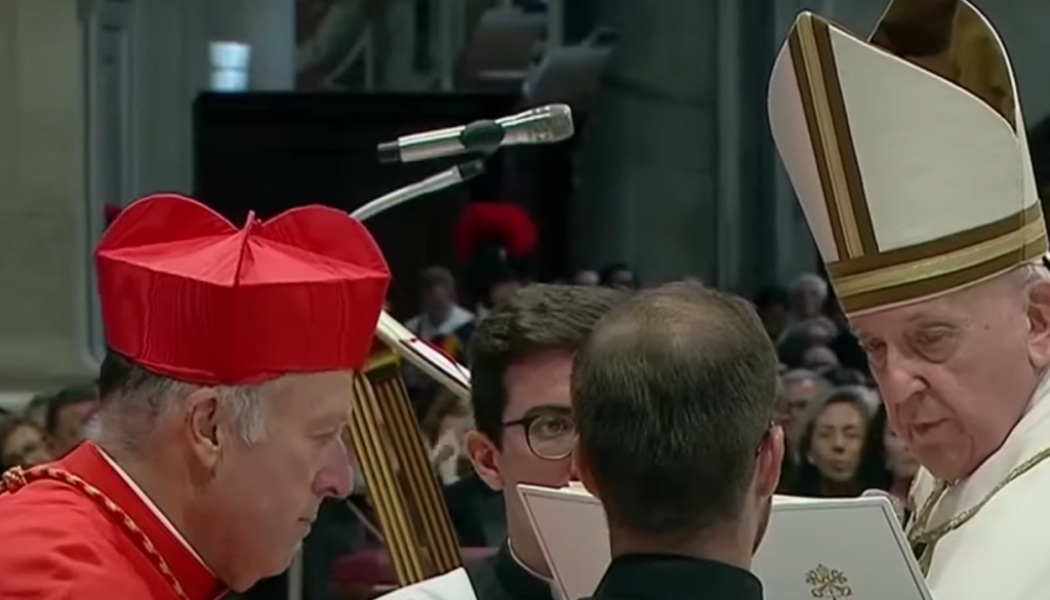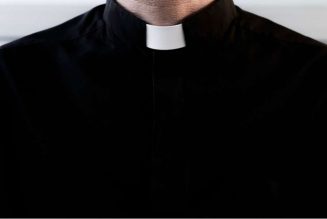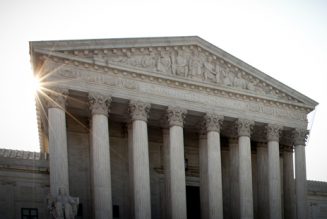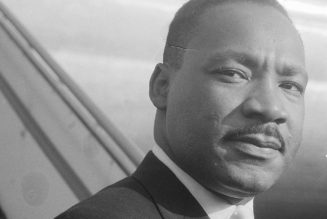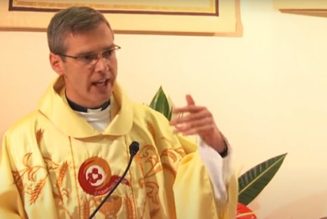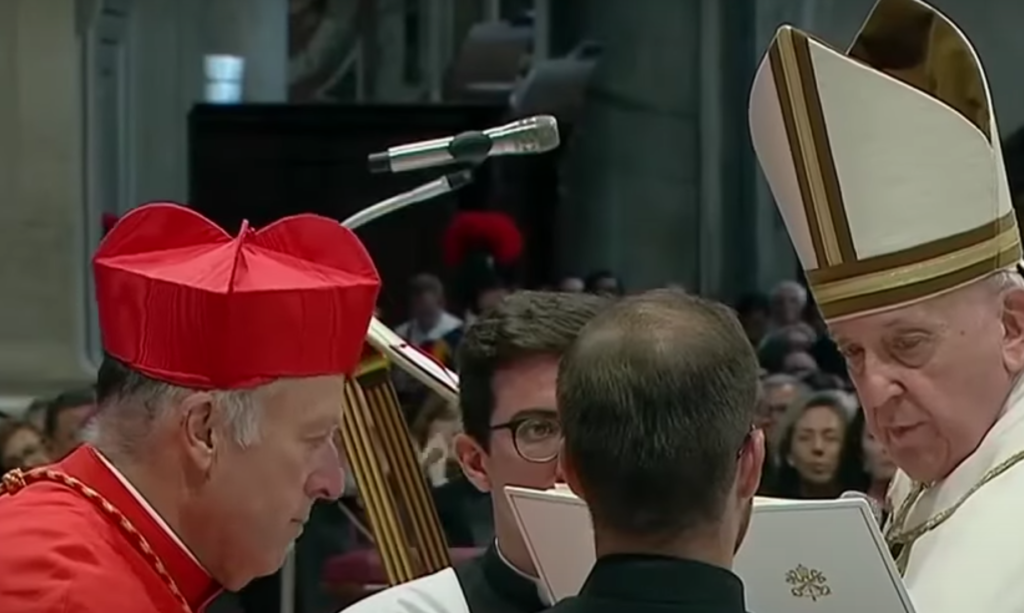
This essay in the Jesuit magazine America, by Cardinal Robert McElroy of San Diego (above, being made a cardinal by Pope Francis), brings the dubious insights of Critical Theory to the life of the Roman Catholic Church. It is an astonishing document that lays bare the agenda of Pope Francis — who made McElroy a cardinal — and his supporters to radicalize Catholicism. This is something we all should pay attention to, even non-Catholics. The woke are storming the citadel of Western religion.
The language itself is a huge tell. See the words and phrases I have boldfaced in this passage:
It is important at this stage in the synodal process for the Catholic community in the United States to deepen our dialogue about these structures and cultures of exclusion for two reasons. The first is to continue to contribute to the universal discernment on these issues, recognizing that these same questions have surfaced in many nations of the world. The second reason is the recognition that since the call to synodality is a call to continuing conversion, reforming our own structures of exclusion will require a long pilgrimage of sustained prayer, reflection, dialogue and action—all of which should begin now.
Such a pilgrimage must be infused with an overpowering dedication to listen attentively to the Holy Spirit in a process of discernment, not political action. It must reflect the reality that we are part of a universal and hierarchical church that is bound together on a journey of faith and communion.
As faithful Protestants who have watched their own churches fall to the woke over the past two or three decades, the call to “dialogue” is a trap. They say that they just want to talk, but by now, anyone with half a brain understands that “dialogue” is a tactic to be used only until the Left gains power, after which “the Holy Spirit has spoken,” and the dialogue ends. The use of the term “structures of exclusion” is pure Critical Theory. And of course construing the discussion about Truth is a “journey” that goes only one way.
More:
A synodal culture demands listening, a listening that seeks not to convince but to understand the experiences and values of others that have led them to this moment.
Ah yes, “lived experience.” There is nothing wrong in principle with listening to people talk about their experiences. That’s not what’s going on here. Some “experiences and values” are more valuable than others. Do you really think that people who affirm the Catechism and the Magisterium of the Church, or the liturgical Traditionalists, will be attended to by the people running the synodal process? And anyway, what is the goal of “listening”? In this case, it’s not for the sake of helping the Catholic laity better live out the truths taught by the Church. It’s about giving the appearance of democratizing the Magisterium (teaching authority) of the Church — on its face deeply problematic in a hierarchical church in which the teaching authority comes from above, but in this case, the concept is being instrumentalized to legitimate the progressive changes in doctrine and practice that the Catholic Left wants to see happen.
More:
One avenue for lifting us up and healing the patterns and structures of marginalization in our church and our world is to systematically bring the peripheries into the center of life in the church.
They all talk the same way, these ideologues. This could have been generated by ChatGPT.
Here’s a bomb:
The synodal dialogues have reflected widespread support for changing these patterns of exclusion in the global church, as well as for altering structures, laws and customs that effectively limit the presence of the rich diversity of women’s gifts in the life of the Catholic community. There are calls for eliminating rules and arbitrary actions that preclude women from many roles of ministry, administration and pastoral leadership, as well as for admitting women to the permanent diaconate and ordaining women to the priesthood.
Pope St. John Paul II said that the question of women’s ordination was closed definitively. Guess not. In his next paragraph, Card. McElroy says that everything related to women that is “not doctrinally precluded” should be on the table. You could say that that was his nod towards the ban on women’s ordination, which JP2 has authoritatively affirmed is not possible ontologically. But why did McElroy mention it in the first place? It’s snaky.
Well, here’s why. Read on:
The question of the ordination of women to the priesthood will be one of the most difficult questions confronting the international synods in 2023 and 2024. The call for the admission of women to priestly orders as an act of justice and a service to the church was voiced in virtually every region of our world church. At the same time, many women and men who participated in the synod favored reserving the priesthood for men in keeping with the action of Christ and the history of the church.
It is likely the synod will adopt this latter stance because of its rootedness in the theology and history of the church. Whichever position emerges from the synodal discernment on this question, the reality remains that the synodal dialogues have asked the church to move in two contradictory directions on this question. During the synodal process over the next two years, God will have to grace the church profoundly if we are to find reconciliation amid this contradiction.
See what he’s doing there? The reconciliation is to be found in those who dissent from the long-established, authoritative Catholic teaching, deeply rooted in the theology and history of the Church (as the cardinal acknowledges), to accept the teaching and stop pushing to overturn it. It is clear from the weaselly way the cardinal has worded his treatment of the issue where he stands on the matter. He’s holding up a teaching that the Church has definitively said is permanently closed for revision up for potential revision. There is not a real conflict here in terms of what the Catholic Church should do. That the cardinal presents it as one, even couched in qualifications, is a tell.
Finally we come to the real reason for the essay:
The report of the synodal dialogues from the U.S. Conference of Catholic Bishops points to an additional and distinct element of exclusion in the life of the church: “Those who are marginalized because circumstances in their own lives are experienced as impediments to full participation in the life of the church.” These include those who are divorced and remarried without a declaration of nullity from the church, members of the L.G.B.T. community and those who are civilly married but have not been married in the church.
These exclusions touch upon important teachings of the church about the Christian moral life, the commitments of marriage and the meaning of sexuality for the disciple. It is very likely that discussions of all of these doctrinal questions will take place at the synodal meetings this fall and next year in Rome.
But the exclusion of men and women because of their marital status or their sexual orientation/activity is pre-eminently a pastoral question, not a doctrinal one. Given our teachings on sexuality and marriage, how should we treat remarried or L.G.B.T. men and women in the life of the church, especially regarding questions of the Eucharist?
“Enlarge the Space of Your Tent” cites a contribution from the Catholic Church of England and Wales, which provides a guidepost for responding to this pastoral dilemma: “The dream is of a church that more fully lives a Christological paradox: boldly proclaiming its authentic teaching while at the same time offering a witness of radical inclusion and acceptance through its pastoral and discerning accompaniment.” In other words, the church is called to proclaim the fullness of its teaching while offering a witness of sustained inclusion in its pastoral practice.
That buzzword again: “inclusion.” It is always an excuse for tearing down barriers, heedless of why the barriers were put there in the first place. Here’s the key point:
The first is the image that Pope Francis has proposed to us of the church as a field hospital. The primary pastoral imperative is to heal the wounded. And the powerful pastoral corollary is that we are all wounded. It is in this fundamental recognition of our faith that we find the imperative to make our church one of accompaniment and inclusion, of love and mercy. Pastoral practices that have the effect of excluding certain categories of people from full participation in the life of the church are at odds with this pivotal notion that we are all wounded and all equally in need of healing.
“To heal the wounded.” Yes, that’s right. But how does the Church’s medicine heal? In Catholic teaching (and in Orthodox teaching), one must be in a state of grace to receive the Eucharist worthily. Orthodox don’t use that phrase, but we agree with Catholics that to receive the Eucharist, one should not be conscious of serious sin. That means one should have gone to confession, and be seriously committed to repentance. The Eucharist is not a magic pill that heals you no matter what your inner disposition. If you do not recognize that your sins are sins, and/or are not willing to strive to turn away from your sins, and live a holy life, then the Eucharist won’t do you much good — and in fact could do you harm. St. Paul writes in his first letter to the Corinthians:
“Whoever, therefore, eats the bread or drinks the cup of the Lord in an unworthy manner will be guilty of profaning the body and blood of the Lord. Let a man examine himself, and so eat of the bread and drink of the cup. For anyone who eats and drinks without discerning the body eats and drinks judgment upon himself. That is why many of you are weak and ill, and some have died” (1 Cor 11:27-30).
Does the state of a communicant’s soul when he approaches the Eucharist matter? St. Paul says yes, it is a matter of grave importance. Last night in the conversation I had with Andrew Sullivan for his podcast, he dismissed Scripture’s condemnation of homosexual sex as “just a few lines from Paul.” If that is one’s attitude toward Biblical teaching (backed up by the interpretive authority of the Church), then anything goes. To reform the Catholic Church’s Eucharistic discipline would amount to changing its theology — and this is a very, very big deal.
I have been a Eucharistic Christian for over thirty years. There have been many times when I wanted to receive communion at mass, or liturgy, but I knew that I couldn’t because I had not been to confession, and I was aware of serious sins I had committed. It was a mercy that I could not partake of communion. Why? Because it was motivation to repentance. If we are broken, and in need of healing, then what would healing look like? It would look like living a holy life. How do we determine what constitutes holiness? Obedience to the Lord’s teaching, in all parts of our life. The Church doesn’t ask us to be perfect before we present ourselves for the Eucharist. It only asks that we be truly repentant. What Card. McElroy calls for here is a profanation of the Eucharist, and for turning it into a placebo. His idea of “healing” is not to lead sinners to holiness, but to lead sinners to being “healed” of the consciousness of their sin, and the feeling of guilt over sins. Would it be healing if a doctor gave his patient a sugar pill for a serious illness? Of course not — it would be malpractice. The same is true for spiritual doctors. Again: implicit in this change of Eucharistic practice is a change of Eucharistic theology, and implicit in that theological shift is the negation of sin. It is a lie.
McElroy writes, “Unworthiness cannot be the prism of accompaniment for disciples of the God of grace and mercy.” Take that, St. Paul! The truth is, in the United States, the practice in Catholic parishes is generally to give communion to anybody who shows up asking for it. I knew that when I was a Catholic — that I could have received communion anytime, no questions asked — but I also knew what the Church’s teaching was, and I wanted to be healed of my tendencies to sin. I knew that the Eucharist could only be effective medicine if I was rightly disposed, spiritually, to receive it. If I had believed the theology of Cardinal McElroy, what would have been the purpose of repentance?
If Cardinal McElroy believed that loosening Eucharistic discipline would lead sinners to repentance, I would disagree with him, but I would still consider that he was arguing in good faith. But he’s not about getting gay Catholics to reform their lives and live as God tells them to live, or divorced Catholics to regularize their standing with the Church. He writes:
It will be objected that the church cannot accept such a notion of radical inclusion because the exclusion of divorced and remarried and L.G.B.T. persons from the Eucharist flows from the moral tradition in the church that all sexual sins are grave matter. This means that all sexual actions outside of marriage are so gravely evil that they constitute objectively an action that can sever a believer’s relationship with God. This objection should be faced head on.
The effect of the tradition that all sexual acts outside of marriage constitute objectively grave sin has been to focus the Christian moral life disproportionately upon sexual activity. The heart of Christian discipleship is a relationship with God the Father, Son and Spirit rooted in the life, death and resurrection of Jesus Christ. The church has a hierarchy of truths that flow from this fundamental kerygma. Sexual activity, while profound, does not lie at the heart of this hierarchy. Yet in pastoral practice we have placed it at the very center of our structures of exclusion from the Eucharist. This should change.
It is impossible to square this claim with Scripture. The purity of the body is central to New Testament teaching. Even a secular social scientist like Philip Rieff, an unbelieving Jew, recognizes (in The Triumph of the Therapeutic) that from the days of the early church, the renunciation of “sexual individualism” was “very near the center of the symbolic that has not held.” He meant that renouncing the sexual autonomy and sensuality of pagan culture was at the core of Christian culture—a culture that, crucially, did not merely renounce but redirected the erotic instinct. That the West was rapidly re-paganizing around sensuality and sexual liberation was a powerful sign of Christianity’s demise.
Cardinal McElroy and his followers, by denying the importance of chastity, are destroying what’s left of orthodox Christianity. It is certainly true that Christianity is “therapeutic” in the sense that it is meant to heal our broken souls by showing us how to be reconciled to God, and to live holy lives. What McElroy offers is false medicine, a quack cure. In Live Not By Lies, I wrote about why this anti-Christian idea of the therapeutic is so destructive. Excerpt:
How did maximizing a feeling of well-being become the ultimate goal of modern people and societies? The American sociologist and cultural critic Philip Rieff was not a religious believer, but few prophets have written more piercingly about the nature of the cultural revolution that overtook the West in the twentieth century that defines the core of soft totalitarianism.
In his landmark 1966 book, The Triumph of the Therapeutic, Rieff said the death of God in the West had given birth to a new civilization devoted to liberating the individual to seek his own pleasures and to managing emergent anxieties. Religious Man, who lived according to belief in transcendent principles that ordered human life around communal purposes, had given way to Psychological Man, who believed that there was no transcendent order and that life’s purpose was to find one’s own way experimentally. Man no longer understood himself to be a pilgrim on a meaningful journey with others, but as a tourist who traveled through life according to his own self-designed itinerary, with personal happiness his ultimate goal.
Man no longer understood himself to be a pilgrim on a meaningful journey with others, but as a tourist who traveled through life according to his own self-designed itinerary, with personal happiness his ultimate goal.
This was a revolution even more radical than the 1917 Bolshevik event, said Rieff. For the first time, humankind was seeking to create a civilization based on the negation of any binding transcendent order. The Bolsheviks may have been godless, but even they believed that there was a metaphysical order, one that demanded that individuals subordinate their personal desires to a higher cause. Almost a quarter century before the fall of the Berlin Wall, Rieff predicted that communism would not be able to withstand the cultural revolution coming from the West, one that purported to set the individual free to pursue hedonism and individualism. If there is no sacred order, then the original promise of the serpent in the Garden of Eden—“[Y]e shall be as gods”—is the foundational principle of the new culture.
Rieff saw, however, that you could not have culture without cult—that is, without shared belief in and submission to a sacred order, what you get is an “anti-culture.” An anti-culture is inherently unstable, said Rieff, but he doubted that people brought up in this social order would ever be willing to return to the old ways. Even church leaders, he wrote, were lying to themselves about the ability of the institutions they led to resist the therapeutic. Rieff foresaw the future of religion as devolution into watery spirituality, which could accommodate anything. Rieff lived long enough to see his 1966 prediction come true. In 2005, the sociologists of religion Christian Smith and Melinda Lundquist Denton coined the phrase Moralistic Therapeutic Deism to describe the decadent form that Christianity (and all faiths, in fact) had taken in contemporary America. It consisted of the general belief that God exists, and wants nothing more from us than to be nice and to be happy.
In therapeutic culture, which has everywhere triumphed, the great sin is to stand in the way of the freedom of others to find happiness as they wish. This goes hand in hand with the sexual revolution, which, along with ethnic and gender identity politics, replaced the failed economic class struggle as the utopian focus of the post-1960s radical left. These cultural revolutionaries found an ally in advanced capitalism, which teaches that nothing should exist outside of the market mechanism and its sorting of value according to human desires.
This is what the denial of the significance of chastity explicit in Cardinal McElroy’s false Gospel means. He is a prince of the Church of Moralistic Therapeutic Deism. And he appears to have the support of the Roman pontiff. The cardinal moves towards his conclusion here:
It is a demonic mystery of the human soul why so many men and women have a profound and visceral animus toward members of the L.G.B.T. communities. The church’s primary witness in the face of this bigotry must be one of embrace rather than distance or condemnation. The distinction between orientation and activity cannot be the principal focus for such a pastoral embrace because it inevitably suggests dividing the L.G.B.T. community into those who refrain from sexual activity and those who do not. Rather, the dignity of every person as a child of God struggling in this world, and the loving outreach of God, must be the heart, soul, face and substance of the church’s stance and pastoral action.
Unbelievable. Screwtape-level deceit! First he characterizes those who believe that what the Church still (for now) teaches about sexuality, in particular gay sex, are motivated by hatred. Some no doubt do hate LGBT people, and if so, they are sinners who need to repent. But McElroy wants to say that if you hate the sin, then you must hate the sinner — and that it is invidious discrimination to divide LGBTs between the chaste (that is, those who make right use of their sexual desire) and the unchaste! There’s no way around it: Cardinal McElroy is here attempting to queer the Catholic Church by saying that gay sex is not sinful.
Liberal and many Mainline Protestant churches have gone this way, abandoning the Bible’s clear teaching, and the unbroken witness of the Christian churches since the Apostolic Age up until the second half of the twentieth century. Back in the early 1990s, when I was feeling called to become a Christian, one major reason I sought to become Catholic, and not some form of Protestant (I didn’t even know what Orthodoxy was back then), was because I was completely sure that whatever problems the Catholic Church had in parish life in the United States, the core doctrinal teaching and leadership from Rome would not change. That it was a rock on which I could confidently stand, if I so chose.
Now look. No wonder the recently deceased Cardinal George Pell was so gravely concerned about the state of the Church under Francis.
Subscribe Today
Get weekly emails in your inbox
There will be many cardinals who will oppose the McElroy position, I’m sure. It will be interesting to see how these apostles of “inclusion,” and “listening to the peripheries,” react when African and Asian cardinals push back hard on blessing homosexuality. Back at the Lambeth Conference in 1998, the global meeting of Anglicans, the radical left-wing lady bishop Barbara Harris, an Episcopalian and the first female bishop in the entire Anglican Communion, cut loose on the orthodox Anglican bishops from Africa, saying that they had been bought off with “chicken dinners” given to them by conservative western Anglicans. She got away with that because she is black herself, and because her racist condescension was deployed in the service of trying to queer worldwide Anglicanism.
Those Catholics rising to oppose this revolution in the Catholic Church must be completely aware of the strategy here, especially the Orwellian use of language by McElroy and the revolutionaries. All of this talk of “dialogue,” “inclusion,” “structures of exclusion,” “journey of faith,” and so forth is designed to frame the conflict in ways that put faithful orthodox Catholics on the defensive. Don’t fall for it. Listen to the orthodox Anglicans, the Methodists, and other Protestants who have endured, or who are currently enduring, a hostile takeover of their church by militantly therapeutic apostles of the anti-Gospel. They have seen all this before. They know how it works. In the West, if these people capture the Catholic Church, what’s left? Pockets of Evangelicalism, I guess, but given its ecclesial structure, Evangelicalism is even more susceptible to shifts in public opinion.
There is, thank God, Orthodoxy. But look: all faithful Orthodox Christians in the West had better prepare for battle now, because this fight is coming to us too. It has already started, from liberal Orthodox academics. There is nowhere to hide.
